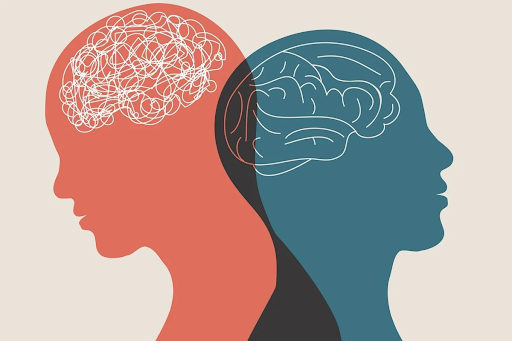 .
.
Copyright infringement not intended
Source: News-Medical
Context
Success in demanding fields necessitates not only intelligence but also strong mental resilience, making it critical to understand and leverage the relationship between mental health and personal identity.
What is stress?
Stress is a sense of emotional or physical tension. It can result from any event or thought that causes you to become frustrated, angry, or nervous. Stress is the body's response to a challenge or demand.
What is the definition of mental wellness?
Mental wellness refers to emotional, psychological, and social well-being. It influences cognition, perception, and behavior. It also influences how a person manages stress, interpersonal relationships, and decision-making.
Why Is Mental Health Important?
Mental health is more important than ever before, as it affects all aspects of our lives. The value of good mental health permeates everything we do, think, and say.
Reasons for Persistent Mental Illness
- Stigma of seeking help: The staggering figures exclude millions of others who have been directly or indirectly affected by the challenge, as well as those who face deep-rooted stigma, which often prevents them from seeking help.
- Lack of awareness: The increasing difficulty in dealing with mental health issues is exacerbated by a lack of information and awareness, self-diagnosis, and stigma.
- Psycho-social factors: Institutions such as gender, race, and ethnicity contribute to mental health conditions.
- Post-treatment gap: There is a need for proper rehabilitation of mentally ill people following their treatment, which does not currently exist.
- Increased Severity: Mental health problems tend to worsen during economic downturns, so special attention is required during these times.
Cultivating the Right Mindset for Success
Fixed Mindset: A Limiting Belief
- A fixed mindset is the belief that capabilities and intelligence are static and cannot be improved.
- Individuals with this mindset often avoid challenges and fear failure, assuming that setbacks reflect their innate limitations.
- This belief system can limit personal potential, hinder progress, and discourage perseverance in the face of obstacles.
Growth Mindset: A Path to Progress
- A growth mindset is rooted in the idea that skills and abilities can be developed through consistent effort and learning.
- Such individuals embrace hard work, dedication, and see mistakes as opportunities for growth.
- It fosters resilience, adaptability, and a continuous learning attitude—all of which are essential for success in competitive environments like the UPSC Civil Services Examination.
Importance in Intense Preparation
- In rigorous preparations, such as for UPSC, a growth mindset is crucial.
- It helps aspirants stay motivated, handle setbacks positively, and persist through long study hours and failures.
- Viewing failures as learning experiences rather than defeats can make a significant difference in one’s long-term success.
Government Policy Initiatives
- National Mental Health Programme (NMHP): Since 1982, the government has implemented the NMHP to address the massive burden of mental disorders and a shortage of qualified mental health professionals.
- Mental Healthcare Act of 2017: It ensures that all affected people have access to mental health care and treatment through government-run or funded services.
- Rights of Persons with Disabilities Act of 2017: The Act recognizes mental illness as a disability and seeks to improve the rights and entitlements of the disabled, as well as provide an effective mechanism for ensuring their empowerment and inclusion in society.
- The Manodarpan Initiative, which is part of the Atmanirbhar Bharat Abhiyan, aims to provide students with psychosocial support for their mental health and wellbeing.
Transformative Power of Language
Language and Identity Formation
- Daily language, particularly our internal dialogue, significantly influences our beliefs, identity, and behavior.
- Common phrases like “I am depressed” or “I am anxious” may appear normal but are internalized by the mind, which gradually aligns our self-image with these statements.
How Language Shapes Action
- Repeated Words Become Beliefs: Constant repetition of certain phrases, whether spoken or internal, results in deep-rooted beliefs.
- Beliefs Shape Identity: These ingrained beliefs gradually shape the core identity of an individual.
- Identity Drives Action: Once formed, this identity becomes the foundation of one’s actions, dictating behavior patterns and decision-making.
The Way Forward
Cease Negative Self-Labeling
- Avoid statements like “I am stressed,” “I am anxious,” or “I am depressed.”
- Such language reinforces a negative identity, making it harder to move forward emotionally and mentally.
Embrace Positive Affirmations
- Replace limiting language with empowering phrases like:
- “I am healing”
- “I am learning to handle challenges”
- These statements foster a growth-oriented mindset, encouraging resilience and progress.
Prioritize Conscious Language Use
- Words are not merely superficial tools—they reshape our mental framework.
- Practicing mindful language use, especially during self-reflection, is essential for building a strong, positive identity.
|
Practice Question
Q. Mental disorders are now among the leading causes of health burden worldwide, with no evidence of a global decline since 1990. Examine.
|




 .
.